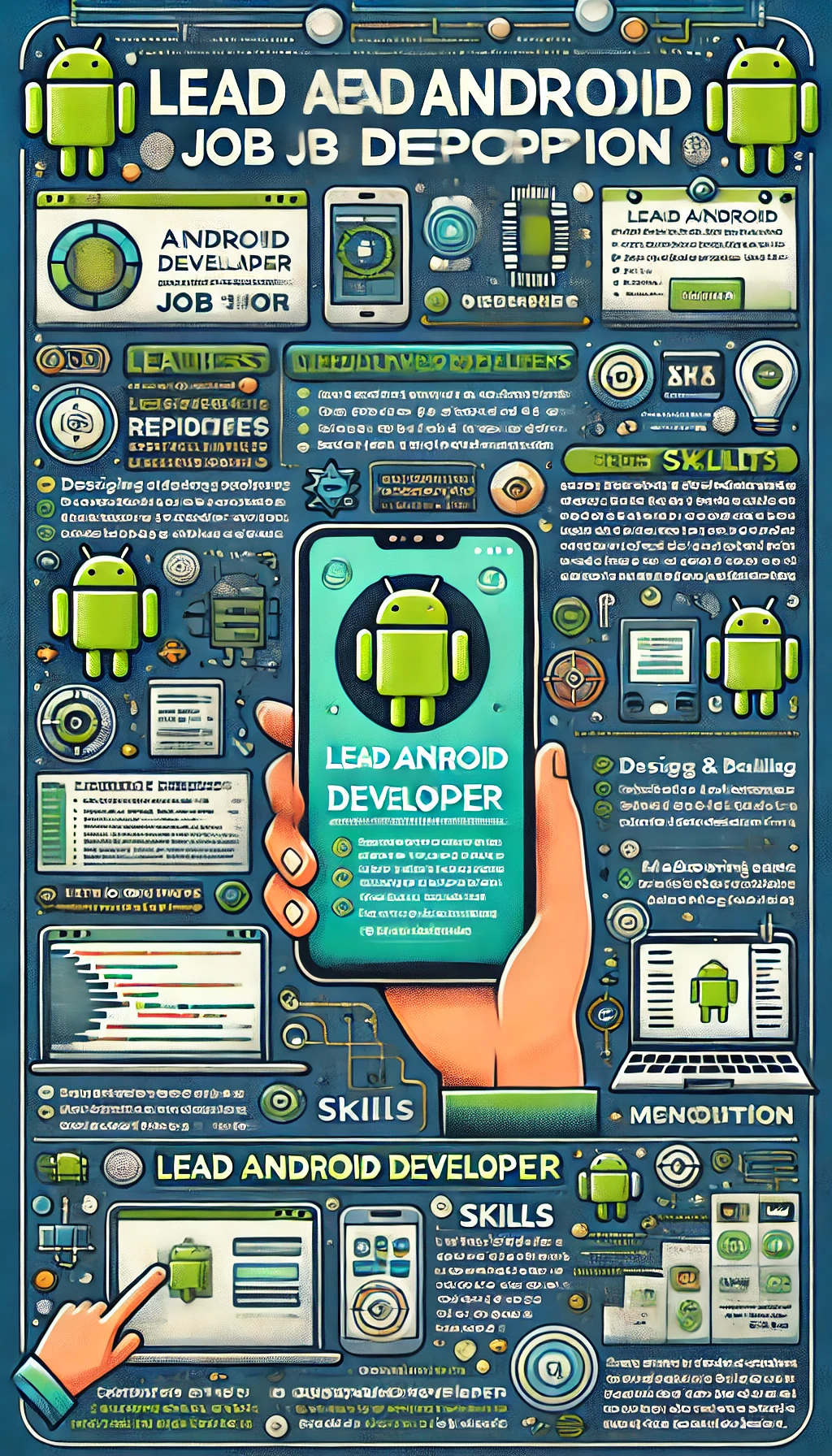In today’s fast-paced digital world, mobile applications have become an integral part of our daily lives. They serve various purposes, from social networking and entertainment to productivity and e-commerce. Behind every successful mobile application, there is a team of skilled developers, led by a proficient Lead Android Developer. This blog post provides an in-depth look into the lead android developer job description, highlighting the essential skills, responsibilities, and career prospects for this pivotal role.
Table of Contents
- Introduction
- What is a Lead Android Developer?
- Key Responsibilities of a Lead Android Developer
- Essential Skills for Lead Android Developers
- Educational Requirements
- Career Path and Progression
- Salary Expectations
- Working Environment
- Tools and Technologies Used
- Tips for Aspiring Lead Android Developers
- Common Challenges Faced by Lead Android Developers
- FAQs
Introduction
The rise of smartphones has transformed how we communicate, work, and entertain ourselves. Android, being the most widely used mobile operating system globally, plays a significant role in this transformation. The professionals who lead the development of these Android applications are known as Lead Android Developers. This comprehensive guide delves into the lead android developer job description, providing valuable insights into what it takes to excel in this career.
What is a Lead Android Developer?
A Lead Android Developer is a senior software engineer specializing in designing, developing, and maintaining applications for devices running the Android operating system. In addition to their technical expertise, Lead Android Developers are responsible for overseeing a team of developers, ensuring that projects are completed on time, within scope, and to the highest standards.
Key Responsibilities of a Lead Android Developer
The lead android developer job description encompasses a wide range of responsibilities, each crucial to the successful creation and maintenance of mobile applications. Here are some of the primary duties:
1. Leading Development Projects
Lead Android Developers are responsible for leading development projects from conception to completion. They coordinate with stakeholders, define project requirements, and ensure that the development team meets deadlines and quality standards.
2. Designing and Building Applications
Lead Android Developers design and build mobile applications that are intuitive, responsive, and user-friendly. They work closely with designers to create visually appealing interfaces and ensure a seamless user experience.
3. Writing Clean and Efficient Code
Writing clean, efficient, and maintainable code is a core responsibility of a Lead Android Developer. They use programming languages such as Java and Kotlin to create the app’s functionality and ensure it runs smoothly on various devices.
4. Testing and Debugging
Testing and debugging are critical stages in the app development process. Lead Android Developers must identify and fix bugs, ensuring the application performs well under different conditions. They use various testing frameworks and tools to achieve this.
5. Mentoring and Training
Lead Android Developers mentor and train junior developers, providing guidance and support to help them grow professionally. They share their knowledge and experience to foster a collaborative and productive team environment.
6. Collaborating with Cross-Functional Teams
Lead Android Developers often work in teams with other developers, designers, product managers, and stakeholders. Effective communication and collaboration are essential to align with project goals and deliver a successful product.
7. Staying Updated with Industry Trends
The tech industry is constantly evolving, and Lead Android Developers must stay updated with the latest trends, tools, and best practices. This involves continuous learning and adapting to new technologies and methodologies.
8. Maintaining and Updating Applications
Post-launch, Lead Android Developers are responsible for maintaining and updating applications. This includes adding new features, improving performance, and ensuring compatibility with the latest Android versions.
Essential Skills for Lead Android Developers
To excel in the role of a Lead Android Developer, one must possess a blend of technical and soft skills. Here are some of the essential skills highlighted in the lead android developer job description:
Technical Skills
1. Proficiency in Programming Languages
Lead Android Developers must be proficient in programming languages such as Java and Kotlin. These languages are the foundation of Android app development, enabling developers to create robust and efficient applications.
2. Understanding of Android SDK and Development Tools
A thorough understanding of the Android Software Development Kit (SDK) and development tools like Android Studio is crucial. These tools provide the necessary resources and libraries to build, test, and debug Android applications.
3. Knowledge of APIs and Web Services
Integrating APIs and web services is a common task for Lead Android Developers. They must be familiar with RESTful APIs and JSON to enable smooth communication between the app and external servers.
4. Familiarity with UI/UX Design Principles
Creating a visually appealing and user-friendly interface is essential for any mobile application. Lead Android Developers should understand UI/UX design principles and work closely with designers to implement them.
5. Experience with Version Control Systems
Version control systems like Git are vital for managing code changes and collaborating with other developers. Lead Android Developers should be comfortable using these tools to track and manage their codebase.
Soft Skills
1. Leadership Skills
Leadership skills are essential for managing a team of developers and ensuring project success. Lead Android Developers must be able to motivate, guide, and support their team members.
2. Problem-Solving Skills
Lead Android Developers often encounter challenges during the development process. Strong problem-solving skills are necessary to identify issues, find effective solutions, and implement them efficiently.
3. Communication Skills
Effective communication is crucial for collaborating with team members and stakeholders. Lead Android Developers must be able to articulate their ideas clearly and understand the requirements and feedback from others.
4. Attention to Detail
Attention to detail is essential for writing clean and efficient code, designing user-friendly interfaces, and identifying and fixing bugs. Lead Android Developers must be meticulous in their work to ensure the app’s quality.
5. Adaptability
The tech industry is fast-paced, and Lead Android Developers must be adaptable to new technologies, tools, and methodologies. Continuous learning and the ability to quickly adapt to changes are vital traits.
Educational Requirements
While there is no strict educational path to becoming a Lead Android Developer, a degree in computer science, software engineering, or a related field can provide a solid foundation. Here are some common educational requirements and pathways:
1. Bachelor’s Degree
A bachelor’s degree in computer science or a related field is often preferred by employers. This education provides a strong understanding of programming, software development, and problem-solving skills.
2. Master’s Degree
A master’s degree can enhance your knowledge and skills, providing a deeper understanding of advanced concepts and methodologies. It can also open up more senior positions and career opportunities.
3. Bootcamps and Online Courses
Many aspiring developers opt for coding bootcamps or online courses to gain the necessary skills. These programs offer intensive training in a short period, focusing on practical skills and hands-on experience.
4. Certifications
Certifications can enhance your resume and demonstrate your expertise to potential employers. Google offers the Associate Android Developer certification, which validates your skills and knowledge in Android development.
5. Continuous Learning
The tech industry is ever-evolving, and continuous learning is essential for staying updated with the latest trends and technologies. Lead Android Developers should engage in lifelong learning through online courses, workshops, and industry events.
Career Path and Progression
The lead android developer job description offers various career paths and progression opportunities. Here’s a look at the typical career trajectory for Lead Android Developers:
1. Junior Android Developer
Entry-level positions for Android developers typically involve working under the guidance of senior developers. Junior developers focus on learning the ropes, gaining experience, and building foundational skills.
2. Mid-Level Android Developer
With a few years of experience, developers move to mid-level positions. They take on more responsibilities, work on complex projects, and start contributing to the decision-making process.
3. Senior Android Developer
Senior Android Developers have extensive experience and expertise in their field. They lead projects, mentor junior developers, and play a significant role in the strategic direction of app development.
4. Lead Android Developer
Lead Android Developers oversee development projects, manage teams, and ensure the successful delivery of applications. They provide technical guidance and support to their team members.
5. Mobile Architect
Mobile architects design the overall architecture of mobile applications. They focus on creating scalable, secure, and high-performance systems that align with the company’s goals and objectives.
6. Engineering Manager or Director
Engineering managers or directors oversee the entire development department. They manage teams, set strategic goals, and ensure the successful delivery of projects.
Salary Expectations
Salaries for Lead Android Developers can vary based on factors such as experience, location, and company size. Here’s an overview of the salary expectations for Lead Android Developers:
1. Entry-Level Android Developer
Entry-level Android developers can expect a salary ranging from $50,000 to $70,000 per year. This range can vary based on the location and the company’s size and industry.
2. Mid-Level Android Developer
Mid-level Android developers typically earn between $70,000 and $100,000 per year. Experience and proficiency in specific technologies can influence this range.
3. Senior Android Developer
Senior Android developers can command salaries between $100,000 and $150,000 per year. Their extensive experience and expertise contribute to their higher earning potential.
4. Lead Android Developer
Lead Android Developers can earn between $120,000 and $160,000 per year. Their leadership role and technical skills play a significant part in their compensation.
5. Mobile Architect
Mobile architects can expect salaries ranging from $130,000 to $180,000 per year. Their role in designing complex and scalable systems justifies their higher compensation.
6. Engineering Manager or Director
Engineering managers or directors can earn between $150,000 and $200,000 per year. Their responsibility for overseeing entire development departments contributes to their high salary.
Working Environment
Lead Android Developers typically work in office settings, though remote work has become increasingly common. Here’s an overview of the working environment for Lead Android Developers:
1. Office Setting
Many Lead Android Developers work in office environments, collaborating with team members, attending meetings, and working on projects. Offices provide a structured setting with access to necessary resources and tools.
2. Remote Work
Remote work has gained popularity, allowing Lead Android Developers to work from anywhere. Companies often provide the tools and resources needed for remote work, enabling developers to stay productive and connected.
3. Collaborative Teams
Lead Android Developers often work in collaborative teams, including other developers, designers, product managers, and stakeholders. Effective communication and teamwork are crucial for project success.
4. Flexible Hours
Some companies offer flexible working hours, allowing developers to balance work and personal life. This flexibility can enhance productivity and job satisfaction.
5. Project-Based Work
Lead Android Developers typically work on a project basis, with defined goals and deadlines. This project-based work requires effective time management and organizational skills.
Tools and Technologies Used
Lead Android Developers use a variety of tools and technologies to create, test, and maintain mobile applications. Here are some of the key tools and technologies highlighted in the lead android developer job description:
1. Android Studio
Android Studio is the official integrated development environment (IDE) for Android development. It provides a comprehensive set of tools for coding, testing, and debugging Android applications.
2. Programming Languages
Java and Kotlin are the primary programming languages used for Android development. Developers must be proficient in these languages to create robust and efficient applications.
3. Android SDK
The Android Software Development Kit (SDK) provides the necessary libraries, tools, and documentation for developing Android applications. It includes emulators, sample projects, and development tools.
4. Version Control Systems
Version control systems like Git are essential for managing code changes and collaborating with other developers. These systems track changes, enable code sharing, and facilitate collaboration.
5. Testing Frameworks
Testing frameworks such as JUnit, Espresso, and Robolectric are used to test Android applications. These tools help developers ensure their code is reliable and performs well under different conditions.
6. Firebase
Firebase is a comprehensive platform that provides tools for app development, including authentication, real-time databases, and cloud messaging. It helps developers build and manage mobile applications.
7. RESTful APIs
RESTful APIs enable communication between the app and external servers. Lead Android Developers use APIs to integrate various functionalities, such as fetching data, user authentication, and more.
8. Design Tools
Design tools like Adobe XD, Sketch, and Figma are used to create wireframes, prototypes, and design assets. These tools help developers collaborate with designers and implement user-friendly interfaces.
Tips for Aspiring Lead Android Developers
If you’re aspiring to become a Lead Android Developer, here are some tips to help you succeed in this field:
1. Build a Strong Foundation
Focus on building a strong foundation in programming languages like Java and Kotlin. Understanding the basics will make it easier to learn advanced concepts and technologies.
2. Gain Practical Experience
Hands-on experience is crucial for becoming a proficient Lead Android Developer. Work on personal projects, contribute to open-source projects, or take on internships to gain practical experience.
3. Stay Updated with Industry Trends
The tech industry is constantly evolving, and staying updated with the latest trends and technologies is essential. Follow industry blogs, attend conferences, and participate in online communities.
4. Build a Portfolio
Create a portfolio showcasing your projects and skills. A well-crafted portfolio demonstrates your expertise and can impress potential employers.
5. Seek Feedback
Seek feedback from experienced developers and mentors. Constructive feedback can help you identify areas for improvement and enhance your skills.
6. Focus on User Experience
User experience is a critical aspect of mobile app development. Prioritize creating user-friendly interfaces and ensuring a seamless user experience.
7. Learn Version Control
Familiarize yourself with version control systems like Git. These tools are essential for collaborating with other developers and managing code changes.
8. Practice Problem-Solving
Practice problem-solving and algorithmic thinking. These skills are crucial for writing efficient code and troubleshooting issues.
9. Join Online Communities
Join online communities and forums dedicated to Android development. Engaging with other developers can provide valuable insights, resources, and support.
10. Pursue Certifications
Consider pursuing certifications like the Google Associate Android Developer certification. Certifications validate your skills and can enhance your resume.
Common Challenges Faced by Lead Android Developers
Android development can be rewarding, but it also comes with its challenges. Here are some common challenges faced by Lead Android Developers:
1. Fragmentation
Android fragmentation refers to the variety of devices, screen sizes, and OS versions that developers must consider. Ensuring compatibility across multiple devices can be challenging.
2. Performance Optimization
Optimizing app performance is crucial for providing a smooth user experience. Developers must identify and fix performance bottlenecks, optimize memory usage, and ensure efficient code execution.
3. Security Concerns
Security is a significant concern in mobile app development. Developers must implement robust security measures to protect user data and prevent vulnerabilities.
4. Keeping Up with Updates
The Android platform is constantly evolving, with new updates, features, and best practices. Keeping up with these changes requires continuous learning and adaptation.
5. Testing and Debugging
Testing and debugging can be time-consuming and challenging. Developers must ensure their apps perform well under various conditions and identify and fix bugs efficiently.
6. User Expectations
Users have high expectations for mobile applications. Developers must create user-friendly interfaces, provide a seamless experience, and ensure the app meets user needs and preferences.
7. Collaboration and Communication
Effective collaboration and communication with team members and stakeholders are essential for project success. Developers must work closely with designers, product managers, and other team members.
FAQs
1. What are the primary responsibilities of a Lead Android Developer? The primary responsibilities of a Lead Android Developer include leading development projects, designing and building mobile applications, writing clean and efficient code, testing and debugging, mentoring and training junior developers, collaborating with cross-functional teams, staying updated with industry trends, and maintaining and updating applications.
2. What skills are essential for a Lead Android Developer? Essential skills for a Lead Android Developer include proficiency in programming languages like Java and Kotlin, understanding of Android SDK and development tools, knowledge of APIs and web services, familiarity with UI/UX design principles, experience with version control systems, leadership skills, problem-solving skills, communication skills, attention to detail, and adaptability.
3. What educational background is required for a Lead Android Developer? While there is no strict educational path, a bachelor’s degree in computer science, software engineering, or a related field is often preferred. A master’s degree, coding bootcamps, online courses, and certifications can also provide the necessary skills and knowledge.
4. What career progression opportunities are available for Lead Android Developers? Career progression opportunities for Lead Android Developers include junior Android developer, mid-level Android developer, senior Android developer, Lead Android Developer, mobile architect, and engineering manager or director.
5. What are the salary expectations for Lead Android Developers? Salaries for Lead Android Developers vary based on experience, location, and company size. Entry-level developers can expect to earn between $50,000 and $70,000 per year, while senior developers can command salaries between $100,000 and $150,000 per year. Lead developers, mobile architects, and engineering managers can earn higher salaries.
6. What tools and technologies do Lead Android Developers use? Lead Android Developers use tools and technologies such as Android Studio, Java, Kotlin, Android SDK, version control systems (e.g., Git), testing frameworks (e.g., JUnit, Espresso), Firebase, RESTful APIs, and design tools (e.g., Adobe XD, Sketch, Figma).
7. How can aspiring Lead Android Developers succeed in this field? Aspiring Lead Android Developers can succeed by building a strong foundation in programming languages, gaining practical experience, staying updated with industry trends, building a portfolio, seeking feedback, focusing on user experience, learning version control, practicing problem-solving, joining online communities, and pursuing certifications.
8. What common challenges do Lead Android Developers face? Common challenges faced by Lead Android Developers include fragmentation, performance optimization, security concerns, keeping up with updates, testing and debugging, meeting user expectations, and effective collaboration and communication with team members and stakeholders.
Conclusion
The lead android developer job description encompasses a wide range of responsibilities, skills, and opportunities. Lead Android Developers play a crucial role in creating mobile applications that millions of people rely on daily. By understanding the key aspects of this role, aspiring developers can better prepare for a successful career in Android development. Whether you’re just starting or looking to advance your career, the field of Android development offers exciting challenges and rewarding opportunities.




Leave a Comment